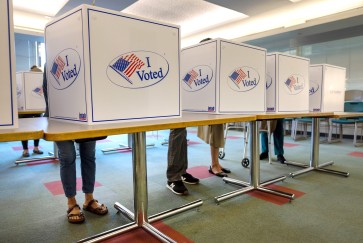Societal challenges, from climate change to public health crises to advancements in artificial intelligence, have been intrinsically linked with scientific progress for generations. But as politics become more polarized, the role of science in law making has become increasingly contested.
A new Northwestern study analyzing congressional committee reports, committee hearings and policy documents from think tanks around the country, found that even though policy citations of science have increased steadily over the last 25 years, Democrats have a propensity to cite impactful science more often than their Republican counterparts in policymaking.
The research team, led by the Kellogg School of Management’s Dashun Wang and Alexander Furnas, observed systematic differences in the amount, content and character of science data cited in policy by partisan factions in the U.S.
Wang is the Kellogg Chair of Technology and a professor of management and organizations at Kellogg and of industrial engineering and management sciences at McCormick School of Engineering and Applied Science, director of Kellogg’s Center for Science of Science and Innovation (CSSI), Northwestern Innovation Institute and co-director of Kellogg’s Ryan Institute on Complexity. Furnas is a research assistant professor at Kellogg CSSI.
Partisanship means a profound tension where science and politics meet.
“Despite recent instances of bipartisan support for science, our study uncovered partisan differences in the use of science that highlight a profound tension at the nexus of science and politics,” Wang said.
Regardless of political party, the use of science in policymaking has increased over the past 25 years. “In society today, many of the societal challenges are intrinsically linked with the latest scientific developments we’ve seen,” Wang said. “It’s welcoming to see that policy makers and the policy documents they generate increasingly rely on scientific evidence.”
Who cites science, when and how?
Science may be more embraced in the public sphere now versus then, but when researchers analyzed policy documents created by left-leaning politicians versus their Republican counterparts, there was a clear disparity. They observed systematic differences in the amount, content and character of science they used.
“We found that policy documents from Democratic-controlled committees are nearly 1.8 times more likely to cite science than those from Republican-controlled committees,” Wang said. “When it comes to think tanks, left-leaning ones are five times as likely to cite science than those produced by right-leaning ones.”
Researchers noticed that under Democratic-control the House Energy and Commerce committee cited science on abortion, drunk driving, youth and e-cigarettes, energy production and infrastructure, gun violence and mental health. When Republicans controlled the committee they were more likely to cite science about health care insurance costs, air pollution, opioids or high-school athletic injuries. But even when they are focusing on the same policy or issue, they don’t cite the same science.
“All the papers that are cited are by construction partisan, but we found that only 5 to 6% of scientific citations are shared by Republicans and Democrats,” Wang said. “Meaning there is much less bipartisan engagement with the scientific literature than expected. They don’t seem to cite the same papers.”
Trust is often understood as the reason that science may or may not be cited in policy making. Researchers found that the marked decline in conservatives’ trust in science in recent decades, a result of the rising political polarization in the U.S., may be threatening confidence in science.
“Science is supposed to be seen as a politically neutral, trusted source of information,” Wang said. “But as our study suggests, different political parties cite different scientific sources to back their claims. That raises the question of whether science is being used selectively to support preexisting beliefs or agendas.”
Breaking down the numbers
The researchers analyzed all congressional committee reports since 1995, committee hearings since 2001 and 191,118 policy documents published by 121 U.S.-based ideological think tanks after 1999. They also looked at a large-scale publication and citation database that captures 122 million scientific publications across disciplines. Linking the two gave them an opportunity to examine the partisan differences in the use of science in policy.
Think tanks — groups of experts that provide advice or ideas on economic and political issues — were an important dataset for the researchers to look at when analyzing where and what type of science was cited.
“Think tanks are an understudied area that have an extremely profound influence in the U.S., unlike other democracies,” Furnas said. “The policy production, idea generation and building of evidence happens in these private institutions. It was important to bring them into the conversation along with formal government institutions.”
Researchers also surveyed 3,500 U.S. political elites and public servants, asking how much they trust or distrust science, regardless of political party. They found 96% of Democratic elites either completely or partially trust scientists to disseminate unbiased knowledge, compared to 63.7% of Republican elites.
Real-world implications today
The researchers are continuing to explore how political dynamics shape the relationship between science and policymaking — including how evidence is produced, interpreted, and used across different institutional settings.
There are also real-world implications when scientific evidence is questioned. Furnas said the current tariff and economic strife is a blatant example.
“There’s economic science about what the impacts of tariffs are. There is a general economist consensus view on U.S. trade policy that is evidence based,” Furnas said. “But because different partisan actors have different commitments, that’s when we might see people cherry picking scientific fact. That’s how you get policy uncertainty.”
In addition to Wang and Furnas, co-authors of the study include Timothy M. LaPira of James Madison University.


